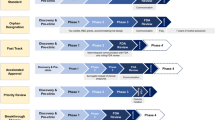Abstract
Background
Patients who are seriously ill and have run out of available treatment options may seek access to investigational agents that have not yet been fully vetted by regulatory agencies for safety and efficacy and approved for use in human subjects. Over time, a variety of terms have evolved internationally to denote mechanisms for providing access to such unapproved investigational agents. The lack of consistency in terminology used to describe this process is confusing at best and, at worst, possibly even detrimental to patients.
Methods
To highlight variation around the globe in terminology denoting pre-approval access to investigational agents, we conducted extensive Internet searches to locate specific legislation, guidance, or policy documents describing access mechanisms in numerous countries. We created a table of results intended to convey a sampling of international terminological diversity.
Results
The profusion of terms used internationally to indicate pre-approval access to investigational agents is evident. We recommend a shift toward the use of “pre-approval access” as an umbrella term encompassing all forms of access to unapproved agents. We also recommend use of the phrases “individual/named patient regulatory routes for pre-approval access” and “group/cohort regulatory routes for pre-approval access” to differentiate between pre-approval access programs designed for single patients, versus those designed for groups of patients.
Conclusions
There is a pressing need to revisit and better align pre-approval access terminology at the international level. Adopting the umbrella term “pre-approval access” may be a useful strategy for initiating and promoting harmonization of terms to reduce potential confusion by patients and health care decision makers regarding experimental treatment options.
Similar content being viewed by others
References
Kroll D. Josh Hardy going home after getting Chimerix anti-viral drug. http://www.forbes.com/sites/davidkroll/2014/07/17/josh-hardy-going-home-after-getting-chimerix-anti-viral-drug/. Published 2014. Accessed August 6, 2015.
Pogorelc D. Cancer patient’s compassionate use conundrum incites a social media ambush on BioMarin. MedCityNews. September 24, 2013.
Iudicello A, Alberghini L, Benini G, Mosconi P. Expanded Access Programme: looking for a common definition. Trials. 2016;17:1–10.
Hamel MB, Darrow JJ, Avorn J, Kesselheim AS. New FDA breakthrough-drug category—implications for patients. N Engl J Med. 2014;370:1252–1258.
Food and Drug Administration. Investigational new drug, antibiotic, and biological drug product regulations; treatment use and sale. Final rule. Fed Regist. 1987;52:19466–19477.
Food and Drug Administration. Investigational New Drug (IND) application. http://www.fda.gov/drugs/developmentapprovalprocess/howdrugsaredevelopedandapproved/approvalapplications/investigationalnewdrugindapplication/default.htm. Published 2014. Accessed September 18, 2015.
Food and Drug Administration. Investigational new drug, antibiotic, and biological drug product regulations, procedures for drugs intended to treat life-threatening and severely debilitating illness. Fed Regist. 1988;53:41516–41524.
Falit BP, Gross CP. Access to experimental drugs for terminally ill patients. JAMA. 2008;300:2793–2795.
Food and Drug Administration. New drug, antibiotic, and biological drug product regulations; accelerated approval. Final rule. Fed Regist. 1992;57:58958.
Gaffney A Regulatory explainer: FDA’s Expanded Access (Compassionate Use) Program. Regulatory Focus. 2014.
Food and Drug Administration. Guidance for industry: expanded access to investigational drugs for treatment use—Qs & As. http://www.fda.gov/downloads/Drugs/GuidanceComplianceRegulatoryInformation/Guidances/UCM351261.pdf. Published 2013. Accessed October 12, 2015.
Horsburgh C Jr., Haxaire-Theeuwes M, Lienhardt C, et al. Compassionate use of and expanded access to new drugs for drug-resistant tuberculosis [review article]. Int J Tuberc Lung Dis. 2013;17:146–152.
Hannah S. Learn how to develop a transparent and consistent corporate policy for early patient access [webinar]. http://event.on24.com/eventRegistration/console/EventConsoleNG.jsp?uimode=nextgeneration&eventid=1291923&sessionid=1&username=&partnerref=&format=fhaudio&mobile=false&flashsupportedmobiledevice=false&helpcenter=false&key=0AD3414463532EE4192853B7B98783D7&text_language_id=en&playerwidth=1000&playerheight=650&overwritelobby=y&eventuserid=153927399&contenttype=A&mediametricsessionid=126654385&mediametricid=1868648&usercd=153927399&mode=launch. Published 2016. Accessed December 19, 2016.
Kolva E, Rosenfeld B, Brescia R, Comfort C. Assessing decision-making capacity at end of life. Gen Hosp Psychiatry. 2014;36:392–397.
Bostock S, Steptoe A. Association between low functional health literacy and mortality in older adults: longitudinal cohort study. BMJ. 2012;344:e1602.
Austin CA, Mohottige D, Sudore RL, Smith AK, Hanson LC. Tools to promote shared decision making in serious illness: a systematic review. JAMA Intern Med. 2015;175:1213–1221.
Bernacki RE, Block SD. Communication about serious illness care goals: a review and synthesis of best practices. JAMA Intern Med. 2014;174:1994–2003.
Berkman ND, Sheridan SL, Donahue KE, Halpern DJ, Crotty K. Low health literacy and health outcomes: an updated systematic review. Ann Intern Med. 2011;155:97–107.
Kindig DA, Panzer AM, Nielsen-Bohlman L. Health Literacy: A Prescription to End Confusion. Washington, DC: National Academies Press; 2004.
Code of Federal Regulations. Requirement for all expanded access uses. Fed Regist. 21 CFR 312.305, 212016.
Amgen. Access to investigational medicines. http://www.amgen.com/responsibility/access-to-medicine/access-to-investigational-medicines/. Published 2016. Accessed September 13, 2016.
Shire. Compassionate use. https://www.shire.com/who-we-are/how-we-operate/policies-and-positions/compassionate-use. Published 2016. Accessed September 13, 2016.
Huynh TN, Kleerup EC, Wiley JF, et al. The frequency and cost of treatment perceived to be futile in critical care. JAMA Intern Med. 2013;173:1887–1894.
Zhang B, Wright AA, Huskamp HA, et al. Health care costs in the last week of life: associations with end-of-life conversations. Arch Intern Med. 2009;169:480–488.
Cassel CK, Guest JA. Choosing wisely: helping physicians and patients make smart decisions about their care. JAMA. 2012;307:1801–1802.
Oshima Lee E, Emanuel EJ. Shared decision making to improve care and reduce costs. N Engl J Med. 2013;368:6–8.
Darrow JJ, Sarpatwari A, Avorn J, Kesselheim AS. Practical, legal, and ethical issues in expanded access to investigational drugs. N Engl J Med. 2015;372:279–286.
Caplan AL, Bateman-House A. Should patients in need be given access to experimental drugs? Expert Opin Pharmacother. 2015;16:1275–1279.
Author information
Authors and Affiliations
Corresponding author
Rights and permissions
About this article
Cite this article
Kimberly, L.L., Beuttler, M.M., Shen, M. et al. Pre-approval Access Terminology: A Cause for Confusion and a Danger to Patients. Ther Innov Regul Sci 51, 494–500 (2017). https://doi.org/10.1177/2168479017696267
Received:
Accepted:
Published:
Issue Date:
DOI: https://doi.org/10.1177/2168479017696267




